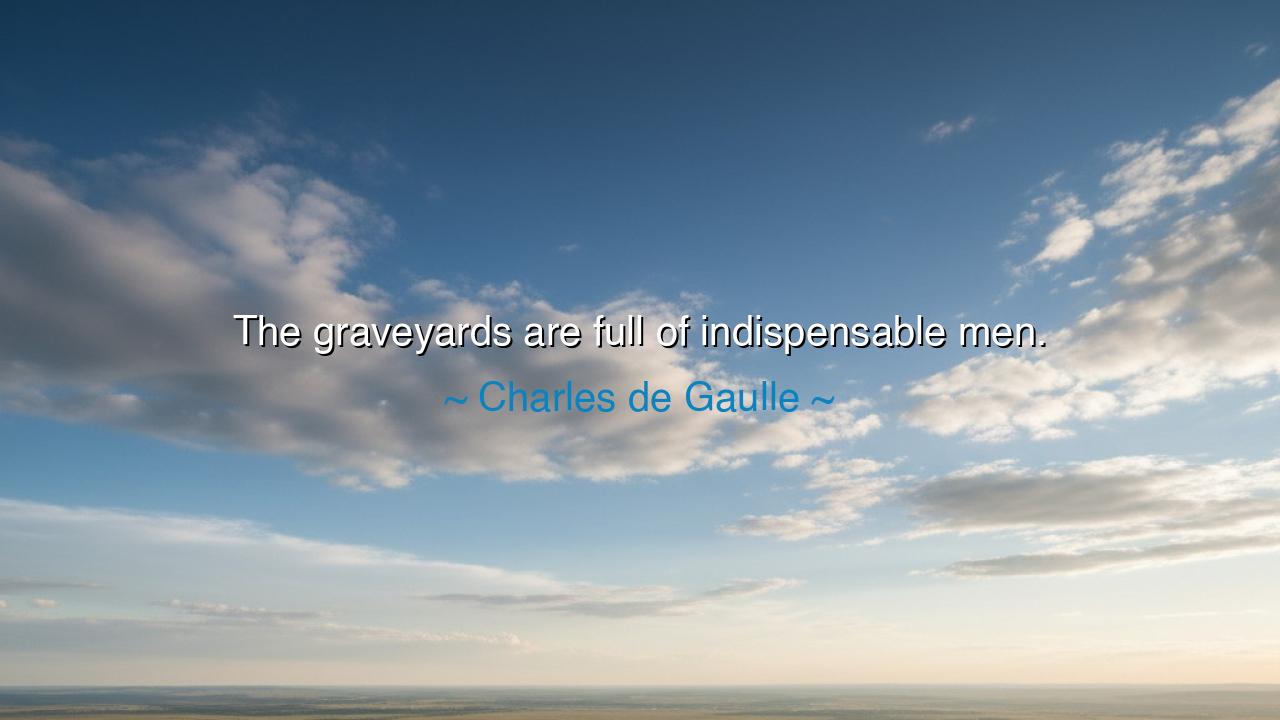
The graveyards are full of indispensable men.






"The graveyards are full of indispensable men." — these words, spoken by the great Charles de Gaulle, strike at the heart of a profound truth that echoes through the ages. They remind us that no man, no matter how powerful, no matter how great his contributions, is truly indispensable. The world, with its vast expanse and countless lives, turns relentlessly forward, indifferent to the loss of even the most revered figures. The graveyards, where the bodies of kings, warriors, and scholars lie side by side, are filled with the same quiet truth: in the end, death comes for us all, and no one is beyond its reach.
In the ancient world, the gods themselves were not immune to the passage of time. The Greeks believed that even the mighty Zeus, ruler of the heavens, could not escape the inevitable forces of fate. The heroes of their myths—Achilles, Hercules, and Odysseus—were all great men, admired by the gods and loved by their people, yet none could escape their eventual end. Achilles, though a warrior without peer, was brought low by an arrow to his heel, a reminder that even the mightiest fall. His story, like that of countless others, is a testament to the fragility of human life, no matter how indestructible one might feel in the moment of glory.
And so, Charles de Gaulle's words carry this ancient wisdom forward. To believe oneself indispensable, to believe that the world cannot move without one, is to deceive oneself. The world, vast and eternal, continues to turn, even as the great and powerful depart. We are all part of a greater cycle, a cosmic rhythm that moves beyond individual lives. Kings, who sit upon golden thrones, and philosophers, whose wisdom shapes civilizations, will one day be dust. Yet, life does not cease with their passing. The world adapts, the people rise, and the wheel of time spins onward. No man, however grand his deeds, is immune from this truth.
Consider the example of Alexander the Great, who carved an empire that stretched across much of the known world. He was a man of unimaginable ambition, whose name was whispered in awe throughout the lands. But upon his death, at the age of 32, the empire he built swiftly fractured. His generals, once loyal, began to feud, and the vast kingdom he left behind crumbled under the weight of his absence. His death served as a stark reminder of de Gaulle's words: even the most indispensable men are but fleeting figures in the grand tapestry of time.
The message here is one of humility. To believe oneself indispensable is to fall prey to hubris—the belief that the world cannot function without our presence. This is not to say that our lives and deeds are without meaning. Indeed, they can be profound and transformative, shaping the course of history in ways we may never fully understand. But the world moves on, regardless of our individual contributions, and the universe continues its eternal dance. We are but temporary vessels, passing through the river of time, leaving ripples behind us. To embrace this truth is not to diminish the value of our lives, but to humble ourselves before the greatness of the world and the passage of time.
In our own lives, we must recognize the fragility of our existence and the importance of legacy. What we leave behind is not our individual greatness, but the impact we have on the world, the connections we make, and the way we have treated others. A warrior may fall in battle, but the lessons he taught, the courage he inspired, and the lives he touched live on. A philosopher may pass into the unknown, but the wisdom he imparted continues to shape generations to come. We must live with the awareness that our time is fleeting, that we are part of a greater whole, and that our greatest legacy is how we live and love, not how indispensable we believe ourselves to be.
Thus, the lesson of de Gaulle’s words is a call to live with grace and purpose. Recognize that we are not the center of the universe, but rather humble participants in a larger story. We must act with the awareness that our time is short, and seek not to make ourselves indispensable, but to leave a mark that endures beyond our mortal lives—a legacy of kindness, wisdom, and service to others. Let us embrace the truth of our impermanence, and in doing so, live fuller, richer lives, knowing that we are part of a cycle that continues long after we are gone.






AAdministratorAdministrator
Welcome, honored guests. Please leave a comment, we will respond soon